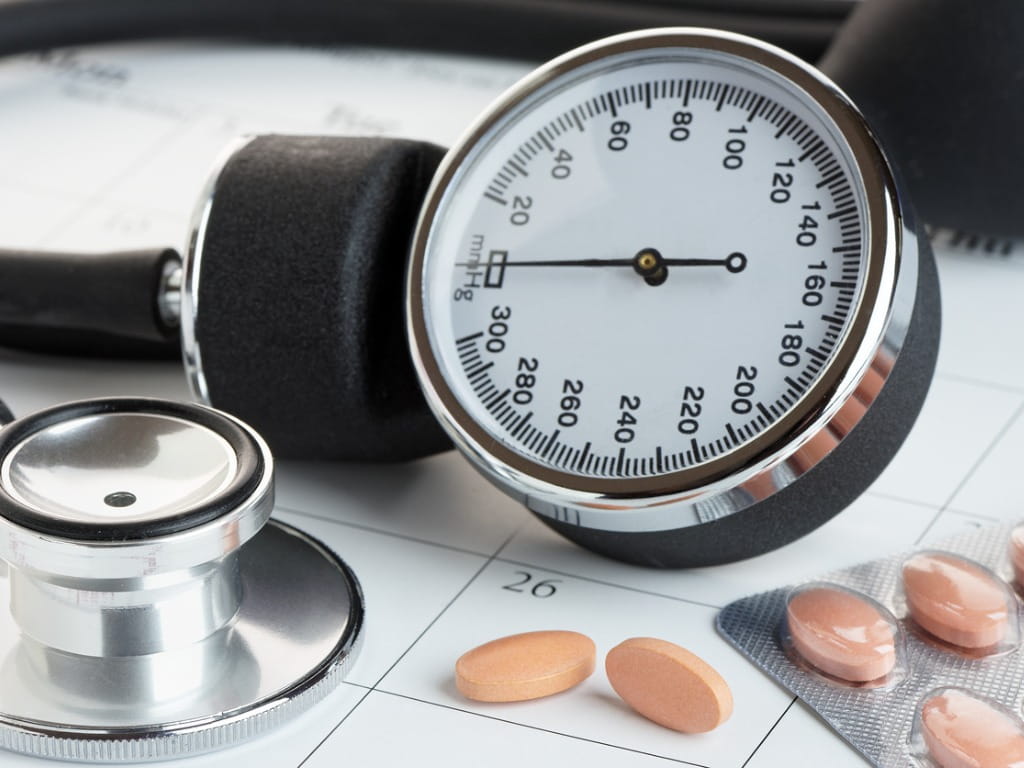What is Angioedema?

The Bottom Line
Angiotensin-converting enzyme inhibitors (ACE-inhibitors) are safe and effective medications used to treat and prevent many cardiovascular conditions. Angioedema, a rare but serious complication, may occur in some people who take ACE inhibitors.

The Full Story
ACE-inhibitors are medications that are commonly used for the treatment of high blood pressure and heart failure, and to prevent kidney disease in patients with diabetes. Their names end with “pril” and examples include lisinopril, enalapril, and ramipril. They work by blocking the ACE enzyme in the body, which is the enzyme that produces angiotensin II, a hormone that that causes blood vessels to constrict. Constriction of blood vessels leads to high blood pressure and kidney problems and worsens heart failure.
ACE-inhibitors are very effective at reducing blood pressure, preventing kidney failure, and decreasing death from heart failure. For this reason, they are commonly prescribed medications. At the same time, they are generally well tolerated with mild adverse effects, such as a dry cough and dizziness.
There is one serious adverse effect associated with ACE-inhibitor use, called angioedema. Angioedema is swelling of the tissues primarily around the mouth, lips, and eyes. In more serious cases, the area in the throat around the vocal cords may swell and block the person’s ability to breathe. Angioedema happens in less than 1% of patients taking ACE-inhibitors, but when it does occur, it can be life-threatening because the swelling may close off the airway and make breathing difficult or impossible. Angioedema occurs most frequently within the first week of treatment with an ACE-inhibitor, but in one third of cases, it occurs after months or years of treatment. Angioedema from ACE-inhibitors is five times more common in African Americans than whites.
Angioedema can occur from causes other than ACE-inhibitors, including other medications, allergic reactions, vasculitis (inflammation of the blood vessels), and hereditary diseases. Angioedema can also involve other areas of the skin and the intestinal tract, but this is more common with causes of angioedema not related to medication. One other important class of drugs that cause angioedema, but less commonly than ACE-inhibitors, is angiotensin receptor blockers (ARBs). These drugs are similar to ACE-inhibitors and often end with “artan”. Common examples include losartan and valsartan.
Angioedema from ACE-inhibitors is not an allergic reaction; it is caused by a chemical called bradykinin that accumulates in the body when taking an ACE-inhibitor. Sometimes medicines used to treat allergic reactions such as steroids or antihistamines can also be used to treat angioedema, but they are not always effective. The most important part of treatment for angioedema from ACE-inhibitors is stopping the medication and monitoring the swelling. This is best done in an emergency department or hospital because if the swelling progresses, it can affect the airway and breathing. Although rare, in these cases a breathing tube may be needed.
It is important to remember if someone has angioedema from an ACE-inhibitor, they should never take that medication again. Other ACE-inhibitors can cause the same reaction and they should be avoided as well. Always let your doctor know if you or a loved one has had angioedema after using ACE-inhibitors, so that a safe substitute can be prescribed. Always tell your healthcare team that you have had angioedema from an ACE-inhibitor so they know to avoid these medications.
If someone on an ACE-inhibitor is having swelling around the face, contact your doctor and seek medical care immediately. If the person is having trouble breathing, call 911 for immediate assistance. Get an immediate personalized recommendation online or call Poison Control at 1-800-222-1222. Both options are free, confidential, and available 24 hours a day.
Maryann Amirshahi, PharmD, MD, MPH, PhD
Medical Toxicologist
Poisoned?
Call 1-800-222-1222 or
Prevention Tips
- Seek medical attention if you are on an ACE-inhibitor and you develop airway swelling.
- Stop taking ACE-inhibitors and never restart them if you have a history of angioedema.
- Inform all members of your healthcare team if you have had angioedema from ACE-inhibitor use.
This Really Happened
Case #1: A 43-year-old woman came to the emergency department one week after starting lisinopril for her high blood pressure. An hour prior to coming in, she noted significant swelling of her upper lip and noticed a “thick” tone to her voice because her tongue was swollen. She called her primary care doctor who sent her to the emergency department. In the emergency department, she was given steroids and antihistamines. An ear, nose, and throat doctor looked in her airway with a small camera. The swelling did not go past the front of the mouth so they watched her for 4 hours and sent her home. Her primary care doctor changed her blood pressure prescription to another type of medication and she did well.
Case #2: A 62-year-old man who was on enalapril for heart failure for many years was brought to the emergency room for a swollen tongue. When paramedics dropped him off, his tongue was so swollen, he was drooling and could not breathe. An ear, nose, and throat doctor placed a breathing tube down the patient’s nose and into his lungs. He was on a ventilator for a couple of days until the swelling went down but made a full recovery. His heart failure team changed his medications while he was in the hospital.
For More Information
American Family Physician. What should I know about ACE-inhibitors?
References
Johnsen S, Jacobson J, Monster T, et al. Risk of first-time hospitalization for angioedema among users of ACE inhibitors and angiotensin receptor antagonists. Am J Med 2005;1:1428-29.
Kaplan AP. Angioedema. World Allergy Organ J 2008;1:103-13.
Kaplan AP, Greaves MW. Angioedema. J Am Acad Dermatol 2005;53:373-88.
Poisoned?
Call 1-800-222-1222 or
Prevention Tips
- Seek medical attention if you are on an ACE-inhibitor and you develop airway swelling.
- Stop taking ACE-inhibitors and never restart them if you have a history of angioedema.
- Inform all members of your healthcare team if you have had angioedema from ACE-inhibitor use.
This Really Happened
Case #1: A 43-year-old woman came to the emergency department one week after starting lisinopril for her high blood pressure. An hour prior to coming in, she noted significant swelling of her upper lip and noticed a “thick” tone to her voice because her tongue was swollen. She called her primary care doctor who sent her to the emergency department. In the emergency department, she was given steroids and antihistamines. An ear, nose, and throat doctor looked in her airway with a small camera. The swelling did not go past the front of the mouth so they watched her for 4 hours and sent her home. Her primary care doctor changed her blood pressure prescription to another type of medication and she did well.
Case #2: A 62-year-old man who was on enalapril for heart failure for many years was brought to the emergency room for a swollen tongue. When paramedics dropped him off, his tongue was so swollen, he was drooling and could not breathe. An ear, nose, and throat doctor placed a breathing tube down the patient’s nose and into his lungs. He was on a ventilator for a couple of days until the swelling went down but made a full recovery. His heart failure team changed his medications while he was in the hospital.
